New first-tier cities present a world of opportunity as the battle for expertise intensifies
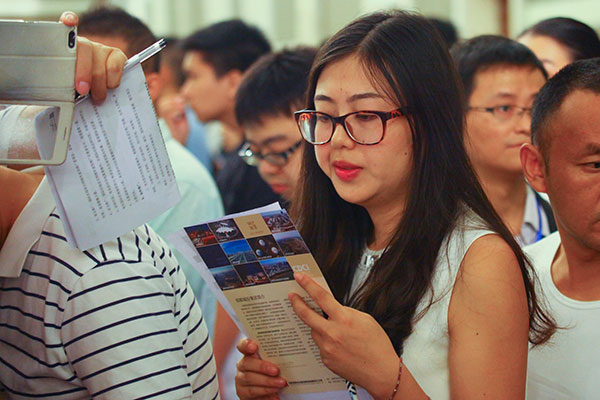
The search for talent and expertise is not unusual but its frequency seems to have accelerated this year, and a competition has begun.
In February, the Hubei provincial capital Wuhan announced a plan to attract 1 million university graduates in the next five years. The news seems have triggered a domino effect.
The Shaanxi provincial capital Xi’an and Hunan provincial capital Changsha drafted similar five-year plans in May and June. While Xi’an plans to invest 3.8 billion yuan ($578 million) to attract 1 million candidates with suitable expertise, Changsha will invest 10 billion yuan to do the same. At least another eight provincial capitals have so far announced preferential policies to attract talent and expertise. Smaller cities are doing the same.
Experts said an unprecedented battle for talent has started in the country and will continue to become fiercer as innovation and technology-driven industrial upgrading continues across the country.
Statistics have shown a trend of talent flowing to other cities from crowded and resource-strained first-tier cities of Beijing, Shanghai, Guangzhou and Shenzhen.
Experts believe competition for talent will speed up the flow and that first-tier cities will face the task of introducing additional talent with international perspectives as the country goes ahead with economic globalization.
Many cities have lowered or even lifted the threshold for talent with bachelor or higher degrees to get hukou, or household registration. Many also offer cheap apartments, subsidies for buying homes, or even cash rewards.
Currently in China, without hukou, people may be excluded from the benefits of social welfare locals enjoy. In some cities, for example, children without hukou are restricted from schools.
The Wuhan government is building apartments especially to accommodate 200,000 people with expertise introduced to the city over the following five years. Those graduates who have left college in the last three years can apply for the apartments if they don’t own a home in the city.
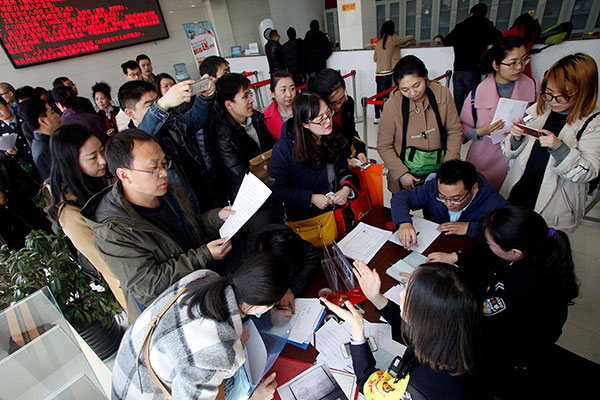
Li Xing, 27, who graduated from Hubei University in 2015 with a bachelor’s degree in Chinese, got one of the first 3,605 apartments in Wuhan in July. The primary school Chinese teacher said she only pays 1,400 yuan a month for her apartment, but the market rent is at least 2,700 yuan. And she also enjoys free tap water and electricity.
Changsha will give subsidies of 15,000 yuan and 10,000 yuan to those with doctorates and bachelor degrees respectively and 6,000 yuan for a master’s degree for the first two years after they settle down and work in the city.
The fierce competition for talent is taking place against the backdrop of a changing economic structure.
The country is upgrading its economy to make it more knowledge-based and technology-driven. This has brought major cities huge opportunities, said Guo Sheng, chief executive officer of Zhaopin.com, a leading recruitment website in the country.
Ni Pengfei, director of City and Competitiveness Research Center at the Chinese Academy of Social Sciences, agrees. “Generally speaking, GDP growth in many cities has been more and more innovation-driven rather than capital-driven,” he said. “The new development mode is highly related to talent and technology. This is why there has been such fierce competition for talent.”
According to a “comprehensive business index” formulated by CBN Weekly, 15 cities are recognized as “new first-tier cities”, including the Zhejiang provincial capital, Hangzhou, Jiangsu provincial capital, Nanjing, Sichuan provincial capital, Chengdu, and Qingdao in Shandong province, as well as Wuhan, Tianjin, Xi’an and Chongqing.
The competition for talent is just the primary stage of a broader industrial competition among major cities. These cities are now accumulating reserves for further industrial competition, which will be fiercer and fiercer, Ni told Oriental Outlook magazine.
Cities like Wuhan deserve applause for the preferential policies they introduced, but there will be far more intense competition for talent in the country, said Xie Shouguang, director of the Social Sciences Academic Press, who specializes in sociological surveys.
“It has been almost 40 years after reform and opening-up was introduced in China. In the past 40 years, ‘investment promotion’ was one of the most important slogans for the country. Now the slogan needs to be changed to ‘talent introduction’,” he said.
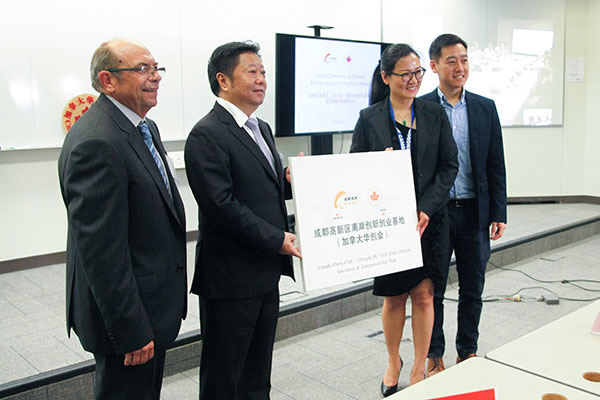
Graduates have expressed a strong desire to work in new first-tier cities.
A 2016 report by Zhaopin, which is based on interviews with 89,000 fresh graduates, has found 38.3 percent of interviewees hoping to work in new first-tier cities, almost 10 percent higher than those who would like to work in first-tier cities.
The company’s 2017 report, which interviewed 93,000 graduates, found 37.5 percent of graduates were willing to work in new first-tier cities, while that for first-tier cities stood at about 30 percent.
Guo said, however, these major cities may fail to attract many of the talents they need if they only provide preferential policies for property and subsidies.
“High-end talent actually cares more about the general environment. While conditions for scientific research matters, the social environment, including educational opportunities for children, is also important,” he said, adding the major attraction for middle-end talent is good enterprises with excellent entrepreneurs.
The most efficient measure for these major cities is to attract those who left for further education back to their home cities, he added.
He said, however, it’s wise for graduates to choose to work in these major cities at this time.
Many of the major cities are accumulating the conditions for a sharp rise in new talent. It may be too late if people choose to work in these cities several years later when living costs, including property prices, have gone up, he said, citing Shenzhen as an example.
“Jobseekers will never regret their decision to work in new first-tier cities. Time will prove them wise after three or five years though many currently fail to see the emerging trends of these cities,” he said.
As domestic talents flow to these major cities, the first-tier cities face a different task of attracting talent with an international perspective as China carries out the Belt and Road Initiative and moves ahead in economic globalization, said Wang Huiyao, president of the Center for China and Globalization, one of China’s leading independent think tanks.
“Instead of choosing talent from the more than 1.3 billion population in China, the first-tier cities should broaden their perspectives and attract talent from the 7 billion global population,” he said.
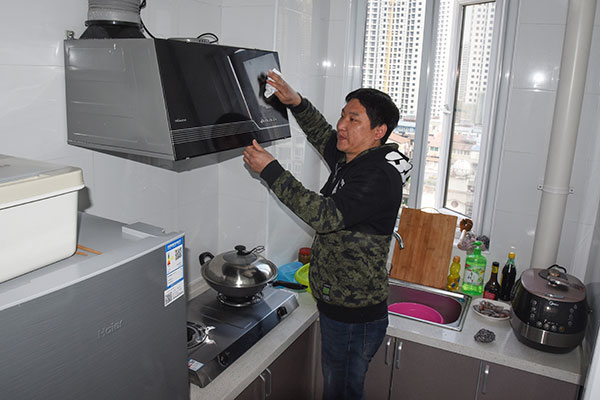
Candidates with the right educational qualifications can expect a package of inducements
HOU LIQIANG
Three cities map out their incentives as they vie to attract the people who will bring greater growth:
CHENGDU:
1. No threshold for graduates with a bachelor’s or a higher degree to get hukou, or household registration.
2. Graduates with a bachelor’s or a higher degree from non-local universities can live in “talent hotels” for seven days for free when seeking jobs.
3. About 300,000 “talent apartments” will be built in the following five years for urgently needed expertise. The successful candidates can buy the apartment at prices lower than the market after they rent for five years. The size of these apartments ranges from just under 60 square meters to no more than 120 sq m.
4. For those who graduated less than five years previously and started businesses in the city, the government will help them get a three-year interest-free loan of up to 500,000 yuan ($75,400).
5. Foreign students in China who come to the city to start businesses will be given residence permits for up to five years. Other foreign students who come to the city to work as interns can get visas for their internship.
WUHAN:
1. For students who graduated less than three years previously: No threshold to get hukou as long as they come to work or start their business in the city; eligible to apply for “talent apartments”, rental of which is much lower than the market. The Wuhan government plans to build such apartments to accommodate 200,000 people in the following five years.
2. For students on campus or who have graduated no more than five years previously: The government will offer credit guarantees for them to apply for loan of up to 2 million yuan.
3. A special coupon will also be given as reward to buy or rent homes. The Wuhan government has not said how many such coupons will be issued or their face value, but said the coupon will be issued based on the number of graduates it attracts and the amount of tax they pay.
4. More than 3,000 practice bases will be built within five years and cash awards and subsidies will be given to interns in these bases by the end of each year based on the number and quality of the interns. 5. More than 50 entrepreneurship training colleges will be established and each of them will be given a subsidy of 100,000 yuan a year to offer entrepreneurship and innovation training for no less than 100,000 university students a year.
CHANGSHA:
1. No threshold for graduates with a bachelor’s or higher degrees from regular university to get hukou.
2. Graduates with a doctorate, or master’s degree will be given cash rewards of 15,000 yuan and 10,000 yuan respectively and 6,000 yuan for a bachelor’s each year for the first two years after they get hukou and work in the city.
3. Graduates with a doctorate will be given a subsidy of 60,000 yuan to buy their first home in the city and graduates with a master’s degree will be subsidized half of the money.
4. About 200 practice bases will be built to meet the need of graduates for internships and interns in the bases will be given subsidies, the amount not yet disclosed.
5. Those who start businesses in the city will be given various subsidies, including those for entrepreneurship training, startup capital and office renting, the specific amount not yet disclosed. One hundred startup projects will be chosen each year and rewarded up to 500,000 yuan. The award should be less than half of the project’s investment.
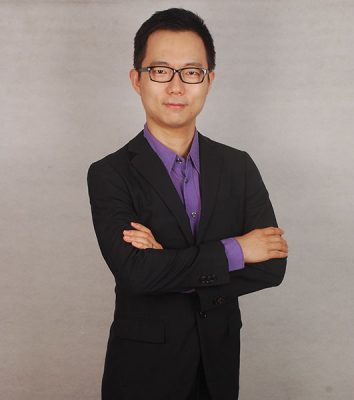
Talent hunters give the best a fresh start
By HOU LIQIANG in Beijing and LIU KUN in Wuhan | China Daily | Updated: 2017-10-06 07:19
Nie Jing
First person: Nie Jing
A tale of success and changing fortunes as a new environment pays off
Nie Jing, 35, is a Wuhan native and CEO of wxiao, an app developer specializing in services for middle and primary schools. With a bachelor’s degree from Huazhong University of Science and Technology and a master’s degree from the University of York in the United Kingdom, he opted to work in Beijing in 2007 and then started his own business in the capital in 2010. He chose, however, to go back to Wuhan in 2015 because of the favorable conditions for entrepreneurship there:
After working in Beijing for eight years, I had been married, had my child and led a stable life. When I joined an activity of Chu’s Back Home, a talent-introduction campaign named after Hubei’s ancient name Chu and mainly aiming at Hubei natives, in 2015, I was attracted back to Wuhan as I found it a far more suitable place for startup companies.
There are abundant resources in Beijing. These resources, however, are highly concentrated. Most opportunities to enjoy these resources are monopolized by big companies. Seldom can startup companies get them.
Meanwhile, we had to establish our office in expensive commercial complexes. We could choose enterprise incubators, if not an actual office in these complexes, but the problem is we had to move again and again as the company expanded.
In stark contrast, we enjoy great cost advantages in Wuhan and various support and preferential policies the local government has offered.
My 500-square-meter office, for example, is offered by the Wuhan government. We got a rent subsidy for the office for two years. It’s in a good location and is only minutes away by foot from the subway station.
With three train stations, the city also boasts a developed transport network. We don’t have to leave as early as we did in Beijing as the subway is not that crowded and road traffic is not that bad.
Our current office is big enough and there is no need to change locations as we develop. The coffee shop downstairs offers us a good place to meet and talk with our clients. There is a big conference room upstairs, where we train employees and give presentations to our clients to demonstrate our products. Moreover, there is also a gym in the building.
We have to make contact with junior high schools and primary schools for our business. In Beijing, we may have been able to persuade 10 schools to use our app in one year. In Wuhan, it’s possible to get 100 schools as clients a year.
Currently, we have developed 12 apps, which cover 5,000 schools and have more than 1 million users.
It’s easier to recruit in Wuhan as well. We mainly turn to on-campus recruitment for new blood. Universities in Beijing charge enterprises a lot for on-campus recruitment.
In Wuhan, as long as we communicate with universities in advance, startup companies like mine could also be arranged suitable times and location. Some universities, for example Central China Normal University, even charge nothing and also offer free drinking water and other services.
More and more people are coming back to Wuhan. When I graduated from Huazhong University of Science and Technology in 2005, only two of my 33 classmates chose to work in Wuhan. Now, one third of them have returned.


